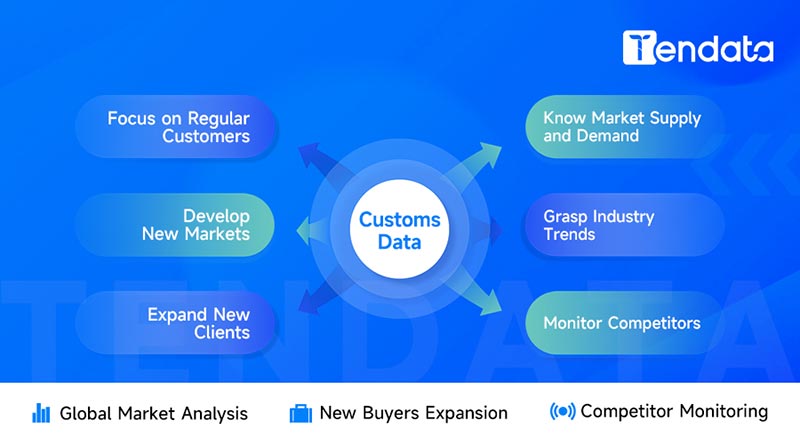 Trade Trends News
Trade Trends News
 14-04-2025
14-04-2025
·Semiconductors and Flat Panel Displays Excluded from Reciprocal Tariffs
·Tech CEOs Embrace Trump in Second Term
·Trump Maintains 20% Tariff on All Fentanyl-Related Imports from China
·Latest Tariff Exemptions Reflect Growing Consumer Pain Awareness
·In 2024, the largest U.S. imports from China are smartphones and laptops.

On April 13, the administration of U.S. President Donald Trump approved exemptions from steep tariffs on smartphones, computers, and several other electronic products primarily imported from China — a major win for tech companies like Apple that rely heavily on these imports.
China stated that it is evaluating the impact of these exclusions. In a statement on Sunday, the Ministry of Commerce called the move "a small step by the U.S. to correct its erroneous unilateral 'reciprocal tariff' actions."
"The bell around the tiger's neck can only be removed by the person who tied it," the Ministry added, urging the U.S. to take significant steps to fully correct its mistakes and completely eliminate the additional tariffs.
In a notice to shippers, U.S. Customs and Border Protection released a list of tariff codes exempt from import duties late Friday. The exemption is retroactively effective from 12:01 a.m. ET (04:01 GMT) on April 5.
The list includes 20 product categories, notably tariff code 8471, which covers all computers, laptops, disk drives, and automatic data processing machines. It also includes semiconductor devices, equipment, memory chips, and flat panel displays.
No explanation was provided in the notice, but the exclusions are a major boost for tech giants like Apple (AAPL.O), Dell Technologies (DELL.N), and many other importers.
This move also exempts certain electronics from the 10% "baseline" tariff Trump has imposed on imports from most countries outside China, effectively reducing import costs for Apple iPhones made in India and semiconductors from Taiwan.
On Saturday, when asked about the rationale for semiconductor exemptions and the overall plan, Trump told reporters: "I'll give you an answer on Monday. We'll have a very specific answer on Monday… We've made a lot of money, as a country, we've made a lot of money."
As for Chinese imports, the tech product exemptions apply only to Trump's reciprocal tariffs, which a White House official said have risen to 125% this week. The 20% tariff Trump previously imposed on all Chinese imports — which he claims is tied to the U.S. fentanyl crisis — remains in effect.
However, the official noted that Trump will soon initiate a new national security trade investigation into semiconductors, which could lead to more new tariffs.
Dan Ives, an analyst at Wedbush Securities, called the tech-related exemption news "the most optimistic thing we've heard all weekend."
"There's still clear uncertainty and volatility in negotiations with China," Ives wrote in an industry report. "But for Apple, Nvidia, Microsoft, and the broader tech sector, this weekend into Monday offers a sigh of relief."
On Friday, Beijing raised tariffs on U.S. imports to 125% in retaliation against Trump's move to increase tariffs on Chinese goods, escalating the risk of a trade war that could disrupt global supply chains.
Last Wednesday, Trump announced a suspension of tariffs on dozens of countries, while raising tariffs on Chinese goods to 145%.
As Trump begins his second term, many tech CEOs have expressed support for him, attending his January 20 inauguration and celebrating with him afterward. Apple CEO Tim Cook even hosted a pre-inaugural ball and visited Trump's Florida residence.
White House spokeswoman Karoline Leavitt stated that Trump has made it clear the U.S. must not rely on China to manufacture critical technologies such as semiconductors, chips, smartphones, and laptops.
She added that under Trump's directive, major tech companies — including Apple, chipmaker Nvidia (NVDA.O), and Taiwan Semiconductor (2330.TW) — "are working to relocate manufacturing to the U.S. as quickly as possible."
The Pain of Tariffs
These exemptions show that the Trump administration is increasingly aware of the impact tariffs have on inflation-weary American consumers.
Even with a lower 54% tariff on Chinese imports, analysts predicted that the price of a high-end iPhone could jump from $1,599 to $2,300. Economists have warned that if tariffs reach 125%, U.S.-China trade could grind to a near halt.
According to U.S. Census Bureau data, the largest import from China to the U.S. in 2024 is smartphones, totaling $41.7 billion, followed by laptops at $33.1 billion.
Reuters reported Friday that Apple recently chartered cargo planes to ship 600 tons of iPhones (up to 1.5 million units) from India to the U.S., after ramping up production there to deal with Trump's tariffs.
Trump's campaign last year focused heavily on promises to reduce prices. But he also pledged to impose tariffs he deemed necessary to reshape the global trade order, acknowledging that market turmoil and price hikes would be the price to pay.
However, his so-called "reciprocal tariffs" have sparked recession fears and criticism from some fellow Republicans concerned about losing control of Congress in next year's midterm elections.
On Friday, Trump told reporters he was satisfied with the steep tariffs on China but maintained a good relationship with President Xi Jinping and believed the trade tensions would ultimately yield positive outcomes.
His tariff policies have rattled financial markets. U.S. stocks closed the week higher despite volatility, while gold hit an all-time high during the day as a safe haven asset. The yield on benchmark 10-year U.S. Treasury bonds posted its largest weekly gain since 2001, and the dollar plunged — all signs of waning confidence in the U.S. economy.
Tendata provides more than 10 billion trade data, covering 228 countries and regions, accumulating more than 10 billion trade transaction details, and a trade database of more than 230 sub-industries.
Searching product keywords or HS codes in Tendata iTrader will allow you to view tens of thousands of active potential customers in the past year, as well as customers' purchase records, including purchase amount, quantity, time, frequency, and their suppliers/buyers. These companies in the Customers List are all customers with needs, and can be used for foreign trade customer development.

Category
Leave Message for Demo Request or Questions


 T-info
T-info T-discovery
T-discovery

 My
Tendata
My
Tendata Market Analysis
Market Analysis Customer
Development
Customer
Development Competitor
Monitoring
Competitor
Monitoring Customer Relationship
Customer Relationship





































































































































